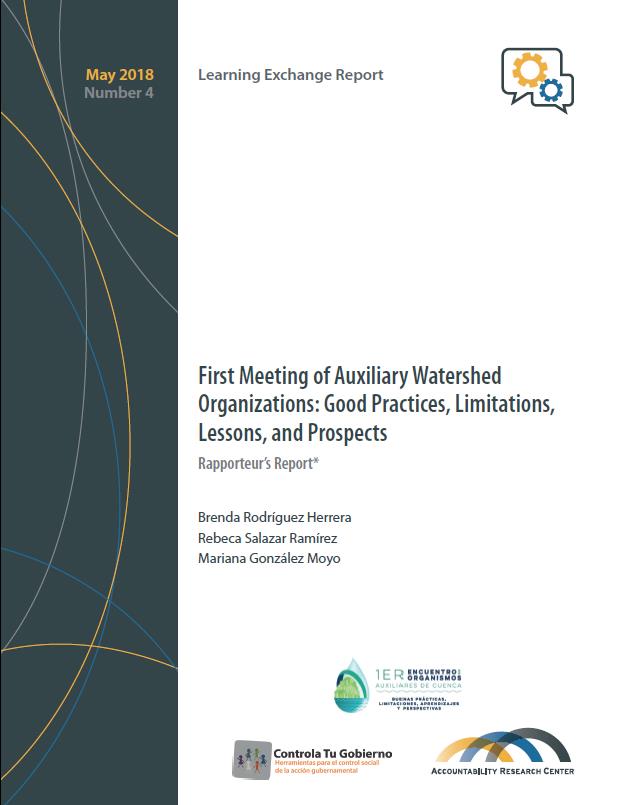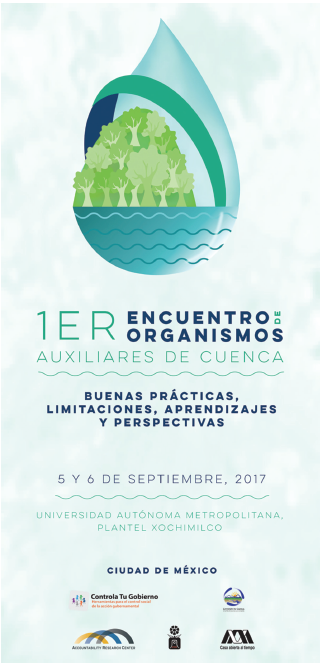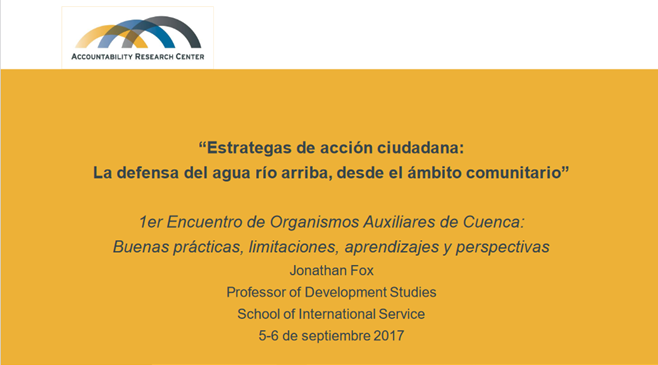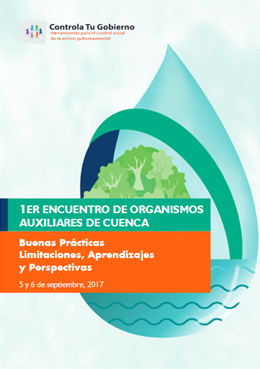
First Meeting of Auxiliary Watershed Organizations: Good Practices, Limitations, Lessons, and Prospects
Date: May 2018
Authors: Brenda Rodríguez Hererra, Rebeca Salazar Ramírez and Mariana González Moyo
Publication type: Learning Exchange Report
Published by: Accountability Research Center, Controla Tu Gobierno
También disponible en español aquí
Ideas were proposed at the First Meeting of Auxiliary Watershed Organizations, held on September 5th-6th, 2017, at the Universidad Autonoma Metropolitana, Xochimilco, Mexico City, that enriched the current debate on water management and the provision of public water and sanitation services in three key areas:
- There is great interest in promoting the participation of the most marginalized and vulnerable communities in water resources management to improve water governance, but this will not be possible without timely, reliable, and complete public information. In Mexico, as in other regions of the world, much remains to be done to get more complete public access to information on water.
- Official institutions for public participation in water management should be transformed to keep them from being merely ornamental mechanisms without any real possibility of influencing decision-making.
- The government’s monitoring and oversight institutions will be relevant to improving public sector performance to the extent that they develop the capacity to connect the dots to identify systemic problems. As long as accountability mechanisms continue to be weak, those who make and carry out water and sanitation policies will continue to lack incentives for taking an interest in the most marginalized and vulnerable communities.

Brenda Rodríguez Hererra Brenda has an undergraduate degree in Communication and a Masters in Rural Development, both from the Universidad Autonoma Metropolitana (Xochimilco) in Mexico City. Since 2006 she has been promoting the Agenda Azul de las Mujeres (Women’s Blue Agenda), an initiative that seeks to incorporate a gender perspective in water policy while also promoting community organizing for equitable and democratic water management with a human rights perspective. In her work Brenda has coordinated community-based advocacy projects on gender, the environment, water, and public policy. She is a member of the Red de Género y Medio Ambiente (Network on Gender and Environment) and the Red Temática: Género, Sociedad, y Medio Ambiente (Gender, Society, and Environment Thematic Network), and a founder of the Coalición de Organizaciones Mexicanas por el Derecho al Agua (Coalition of Mexican Organizations for the Right to Water). Rebeca Salazar Ramírez Rebecca has an undergraduate degree in Economics (Universidad Nacional Autonoma de Mexico) and is pursuing a PhD in Government and Public Administration at the Fundacion Ortega y Gasset and the Universidad Complutense, both in Spain. She has worked at non-governmental organizations in Chile and Mexico, and has been a consultant to the World Bank, International Labor Organization, International Development Research Centre, Heinrich Boll Foundation, Friedrich Ebert Foundation, United Nations Development Programme, United Nations Development Fund for Women, The Nature Conservancy, Fondo Mexicano para la Conservación de la Naturaleza, WWF, and the MacArthur Foundation. She has specialized in gender studies and public policy, environment, and labor markets. Currently working at Mujer y Medio Ambiente (Woman and Environment), Rebeca is also a member of the Network on Gender and the Environment. Mariana González Moyo Mariana has a degree in management and environmental economics from the Universidad de Guadalajara. In 2011 she began to work as an adviser with the ecotourism project known as Eco Aldea Ojo del Cielo (Eye of the Sky Eco-Village); its mission is to foster alternative forms of community development in the state of Nayarit. Mariana has served as an adviser to local governments on public policy-related issues, and currently works with Mujer y Medio Ambiente.


